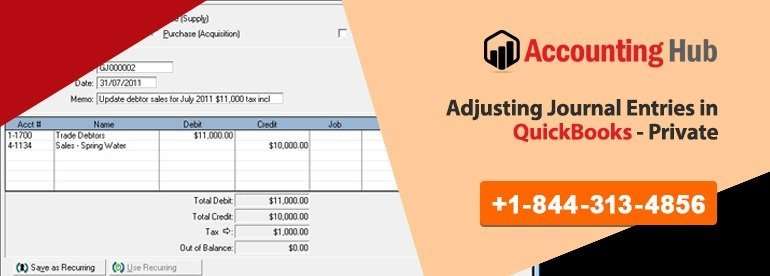In this article, we shall be explaining in detail the Adjusting Journal entries in QuickBooks accounting software and why they are important from the business point of view.
Accurately documenting your transactions in the accounting software isn’t always sufficient to keep your proceeding precises’. If you are making use of the accrual accounting, your bookkeeper must also record adjusting journal entries to keep your accounting compliance.
By documenting these entries before you create fiscal reports, you’ll get a better hang about the actual income, expenditures, and your present financial standing.
Before we move further, let’s try to know the difference between Accrual bookkeeping and Adjusting Journal entries.
Accrual Bookkeeping and Adjusting Journal Entries
When you are making use of the cash process of accounting, a company in that case records expenditure when it reimburses a bill and income when it accepts money. Here the tricky thing is that the incoming and outgoing of money doesn’t always fall in line with the real income and expenditure.
Let’s say, for instance, a customer pays you in advance for 6 months’ worth of assignment. In cash accounting, income will seem to be excessively high in the initial month, but it will start plummeting to zero in the coming next 5 months.
When we talk about the accrual accounting, incomes and expenditures are logged when the incomes and expenditures really come about rather than when the cash proceedings ensue. To place these incomes and expenditures in the correct period, a certified public accountant will be adjusting journal entries in your books.
Different Kinds of Adjusting Entries
Basically, the adjusting entries come under one of 5 groups as mentioned below:
- Accrued expenses are the ones that you have accrued but have not reimbursed yet. A common accrued expenditure is a loan interest disbursement that is outstanding once a year. These expenses typically recorded as accounts payable liabilities.
- Deferred expenses are expenditures that you have reimbursed but not yet gained any benefit from it. For instance, if you pay your health insurance say about two years in advance, then it will be considered as a deferred expense. This type of expense’s documented as assets in the balance sheet.
- Accrued revenues are the ones on which you have received the revenue; however, have been waiting for the cash disbursement. This type of revenue is documented as accounts receivable, in an asset account.
- Deferred revenues ensue when you have been received a payment from a customer in advance but you have not yet completed the assignment. This reflects liability in your balance sheet.
- Noncash transactions signify expenditures and funds that don’t have cash influence on your commerce. Devaluation and stipend for uncertain accounts are two instances of usual noncash transactions.
Why and When Adjusting Entries are Recorded in Your Accounts
Well, how frequently your company should document the adjusting journal entries completely depends on your varying business requirements. Be it just once in a month, three-monthly, two times a year, or just once a year could be the right intervals for your business.
However, if you aim to make use of the accrual accounting, then you unquestionably must record these entries before you create fiscal statements or creditors or venture capitalist.
Preferably, you should record these journal entries even when you are about to make any sort of major fiscal decisions or assess your capitals. In case, you don’t record these entries, then it is quite simple to discard obligations and get a lopsided depiction of your monetary standing.
For instance, if you have at we’ve-monthly loan interest disbursement out standing in the month of Feb and no liability is recorded in your books in the month of Jan, then there are chances that you are going to miscalculate your available cash.
Similarly, if you make a yearly business insurance disbursement and not adjusted the same, then the possibilities of you believing you’re business cost have augmented when has not in real terms
Recording the Journal Entries
Recording the adjusting journal entries necessitates an in-depth knowledge of financial accounting. If an individual who keeps up your finances has got just a basic knowledge of bookkeeping, it won’t be possible for them to record adjusting entries. A qualified and certified bookkeeper can only do this job.
Seeking some more information?
If still a bit unclear about the concept of adjusting journal entries in QuickBooks, consult Accounting Problem QuickBooks enterprise technical support team.

